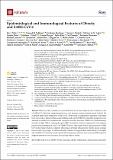Epidemiological and Immunological Features of Obesity and SARS-CoV-2
Author(s)
Nilles, Eric J.; Siddiqui, Sameed M.; Fischinger, Stephanie; Bartsch, Yannic C.; de St. Aubin, Michael; Zhou, Guohai; Gluck, Matthew J.; Berger, Samuel; Rhee, Justin; Petersen, Eric; Mormann, Benjamin; Loesche, Michael; Hu, Yiyuan; Chen, Zhilin; Yu, Jingyou; Gebre, Makda; Atyeo, Caroline; Gorman, Matthew J.; Zhu, Alex Lee; Burke, John; ... Show more Show less
Downloadviruses-13-02235-v2.pdf (3.445Mb)
Publisher with Creative Commons License
Publisher with Creative Commons License
Creative Commons Attribution
Terms of use
Metadata
Show full item recordAbstract
Obesity is a key correlate of severe SARS-CoV-2 outcomes while the role of obesity on risk of SARS-CoV-2 infection, symptom phenotype, and immune response remain poorly defined. We examined data from a prospective SARS-CoV-2 cohort study to address these questions. Serostatus, body mass index, demographics, comorbidities, and prior COVID-19 compatible symptoms were assessed at baseline and serostatus and symptoms monthly thereafter. SARS-CoV-2 immunoassays included an IgG ELISA targeting the spike RBD, multiarray Luminex targeting 20 viral antigens, pseudovirus neutralization, and T cell ELISPOT assays. Our results from a large prospective SARS-CoV-2 cohort study indicate symptom phenotype is strongly influenced by obesity among younger but not older age groups; we did not identify evidence to suggest obese individuals are at higher risk of SARS-CoV-2 infection; and remarkably homogenous immune activity across BMI categories suggests immune protection across these groups may be similar.
Date issued
2021-11-06Department
Massachusetts Institute of Technology. Computational and Systems Biology Program; Ragon Institute of MGH, MIT and Harvard; Massachusetts Institute of Technology. Department of Biological EngineeringJournal
Viruses
Publisher
Multidisciplinary Digital Publishing Institute
Citation
Viruses 13 (11): 2235 (2021)
Version: Final published version
ISSN
1999-4915